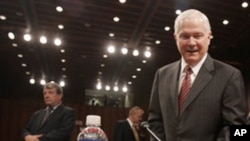U.S. Defense Secretary Robert Gates has sounded a cautious tone on the United States’ ability to help democracy advocates in the Middle East. Gates used what was expected to be a routine speech at a library opening Thursday to send a message about the difference between moral support for the activists and what the United States can and should do based on its national security interests.
It is a thin line many U.S. officials have been trying to walk for months now, since people in several Middle Eastern countries began marching for freedom.
President Barack Obama has made clear the United States supports the spread of democracy, and has urged leaders in the region to accept reforms, with mixed results. Some analysts and members of congress have criticized him for not doing enough to help the demonstrators, while others have criticized him for putting U.S. interests at risk by encouraging the fall of allies in the war on terror, including Egypt’s former president Hosni Mubarak and Yemen’s leader Ali Abdullah Saleh.
On Thursday, speaking at the opening of a library at the home of the first U.S. president, George Washington, Secretary Gates tried to explain what he called the persistent "dilemma" U.S. leaders have faced for more than 200 years between the desire to promote America’s values and the need to protect its interests.
"It is vital that we speak out about what we believe and let the world know where we stand, even as we do what we must to protect our interests and our security," said Gates. "The most successful leaders, starting with Washington, have steadfastly encouraged the spread of liberty, democracy, and human rights. At the same time, however, they have fashioned policies blending different approaches with different emphases in different places at different times."
Gates acknowledged that doing "what we must" has sometimes meant working with what he called "some of the worst violators of human rights," even as American leaders made protection of human rights "the centerpiece" of their foreign policy. And regarding today’s democracy movements in the Middle East, he said, U.S. moral support for demonstrators who are risking their lives for freedom and democracy does not necessarily mean support for quick, destabilizing change throughout the region.
"When we discuss openly our desire for democratic values to take hold across the globe, we are describing a world that may be many years or decades off," he said.
Gates said while the United States would like to see "democratic values" take hold across the globe, achieving that ideal "may be limited by time, space, resources or human nature."
Secretary Gates - who is expected to retire in a few months - has been in government for 40 years and held numerous senior positions at the White House and the Central Intelligence Agency under eight presidents. He is known as a "realist" on U.S. foreign policy. That refers to someone who believes the United States must identify and defend its most important national interests, even if that sometimes involves dealing with dictators or not helping people in need. "Idealists," on the other hand, believe the active promotion of U.S. values is more important, and will serve the country’s security interests in the long term.
In public statements, President Obama and many of his predecessors have tended to emphasize the "idealist" view, as the president did two weeks ago in his speech explaining the U.S. participation in the international military operation in Libya.
"We know that our own future is safer, our own future is brighter, if more of mankind can live with the bright light of freedom and dignity," said President Obama.
But on Thursday, Secretary Gates put the proposition the other way around.
"An underlying theme of American history going back to Washington is that we are compelled to defend our security and our interests in ways that, in the long run, lead to the spread of democratic values and institutions," said Gates.
Gates noted that in the 1780s, President Washington himself chose to restore relations with the monarchy in Britain for economic and strategic reasons, rather than supporting the French revolutionaries who had just rebelled against their king. Gates said "American leaders have struggled with ‘realistic’ versus ‘idealistic’ approaches to international challenges" ever since.




